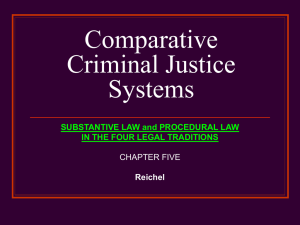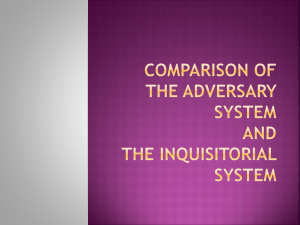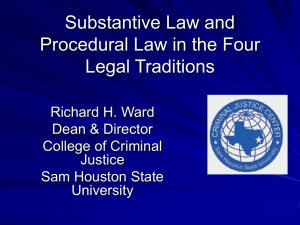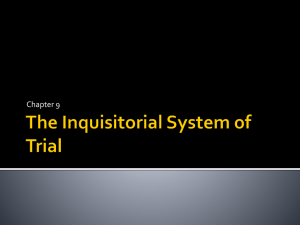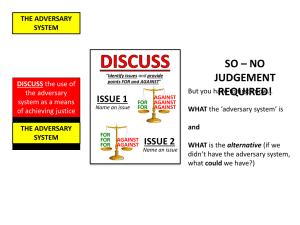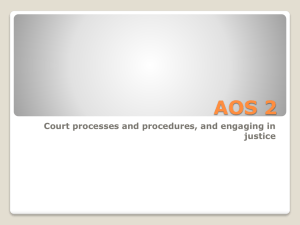Article - Sward, Values and Ideology of Adversarial System
advertisement
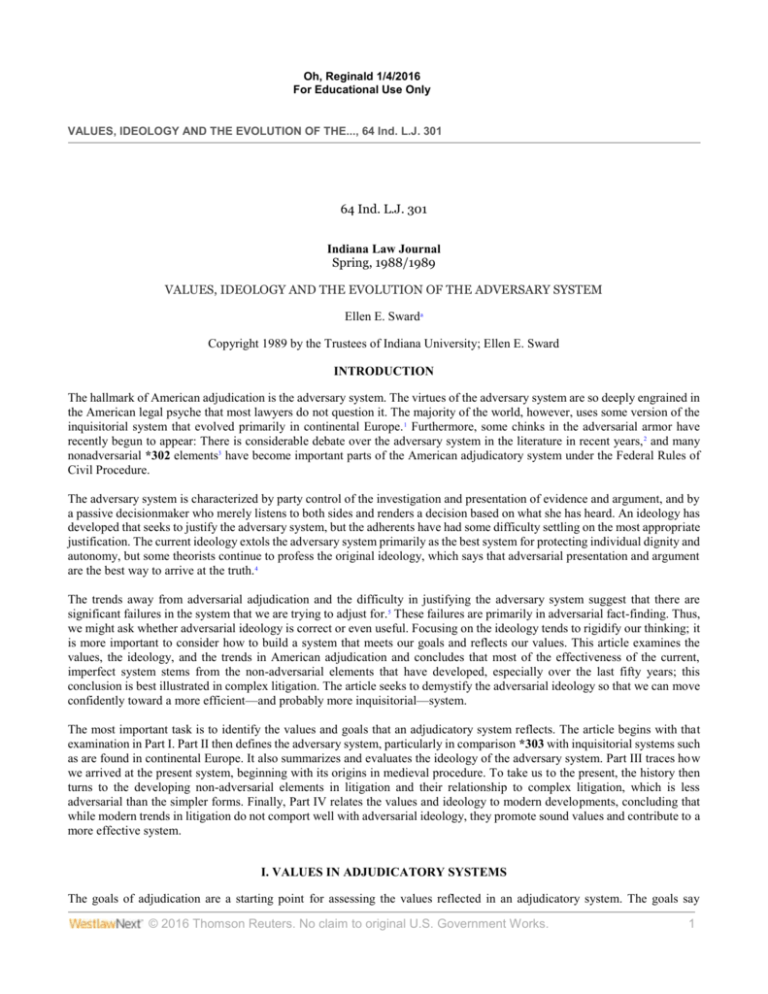
Oh, Reginald 1/4/2016 For Educational Use Only VALUES, IDEOLOGY AND THE EVOLUTION OF THE..., 64 Ind. L.J. 301 64 Ind. L.J. 301 Indiana Law Journal Spring, 1988/1989 VALUES, IDEOLOGY AND THE EVOLUTION OF THE ADVERSARY SYSTEM Ellen E. Swarda Copyright 1989 by the Trustees of Indiana University; Ellen E. Sward INTRODUCTION The hallmark of American adjudication is the adversary system. The virtues of the adversary system are so deeply engrained in the American legal psyche that most lawyers do not question it. The majority of the world, however, uses some version of the inquisitorial system that evolved primarily in continental Europe. 1 Furthermore, some chinks in the adversarial armor have recently begun to appear: There is considerable debate over the adversary system in the literature in recent years, 2 and many nonadversarial *302 elements3 have become important parts of the American adjudicatory system under the Federal Rules of Civil Procedure. The adversary system is characterized by party control of the investigation and presentation of evidence and argument, and by a passive decisionmaker who merely listens to both sides and renders a decision based on what she has heard. An ideology has developed that seeks to justify the adversary system, but the adherents have had some difficulty settling on the most appropriate justification. The current ideology extols the adversary system primarily as the best system for protecting individual dignity and autonomy, but some theorists continue to profess the original ideology, which says that adversarial presentation and argument are the best way to arrive at the truth.4 The trends away from adversarial adjudication and the difficulty in justifying the adversary system suggest that there are significant failures in the system that we are trying to adjust for.5 These failures are primarily in adversarial fact-finding. Thus, we might ask whether adversarial ideology is correct or even useful. Focusing on the ideology tends to rigidify our thinking; it is more important to consider how to build a system that meets our goals and reflects our values. This article examines the values, the ideology, and the trends in American adjudication and concludes that most of the effectiveness of the current, imperfect system stems from the non-adversarial elements that have developed, especially over the last fifty years; this conclusion is best illustrated in complex litigation. The article seeks to demystify the adversarial ideology so that we can move confidently toward a more efficient—and probably more inquisitorial—system. The most important task is to identify the values and goals that an adjudicatory system reflects. The article begins with that examination in Part I. Part II then defines the adversary system, particularly in comparison *303 with inquisitorial systems such as are found in continental Europe. It also summarizes and evaluates the ideology of the adversary system. Part III traces how we arrived at the present system, beginning with its origins in medieval procedure. To take us to the present, the history then turns to the developing non-adversarial elements in litigation and their relationship to complex litigation, which is less adversarial than the simpler forms. Finally, Part IV relates the values and ideology to modern developments, concluding that while modern trends in litigation do not comport well with adversarial ideology, they promote sound values and contribute to a more effective system. I. VALUES IN ADJUDICATORY SYSTEMS The goals of adjudication are a starting point for assessing the values reflected in an adjudicatory system. The goals say © 2016 Thomson Reuters. No claim to original U.S. Government Works. 1 Oh, Reginald 1/4/2016 For Educational Use Only VALUES, IDEOLOGY AND THE EVOLUTION OF THE..., 64 Ind. L.J. 301 something about the structure of society and how society views the role of authority. Similarly telling is society’s view of the importance and definition of ‘fair’ adjudication. Finally, the adjudicatory system reflects the relative importance that society places on individual and communitarian values. This section describes the values as reflected in Western systems in general and the American system in particular. A. Goals of a Procedural System Procedure is simply the means by which we reach decisions. In theory, it has no substantive content but is a neutral set of rules that enables us to reach fair substantive decisions.6 It is, however, important to look at the goals of the procedural system itself, distinct from the substantive decisions that come out of it. Those goals might be termed conflict resolution, rule-making, and behavior modification. 1. Conflict Resolution Resolving conflicts is the primary goal of any procedural system. By providing a forum for conflict resolution and sanctions for failing to abide *304 by decisions of that forum, society reduces its citizens’ desire for self-help. The result is a more orderly society. But if the goal were simply to resolve conflicts, it could be achieved by allowing a judge to flip a coin. Much of the agonizing over appropriate procedural rules could be avoided in such a system. Obviously, however, such a system would not be seen as fair: Victory would depend solely on a random event. Citizens would not voluntarily submit to such a system. The conflict resolution goal, then, is tempered by other goals that limit how conflicts can be resolved. The first of these goals is ‘truth.’ Our procedural system must resolve conflicts in such a way as to achieve a true characterization of the events out of which the conflict arose. Because truth is elusive, however, 7 it is not always possible to be sure of the past.8 Witnesses may differ in what they think they saw;9 or there may be no witnesses on a significant issue so that the past must be reconstructed from circumstantial evidence10 is in some cases, witnesses may deliberately lie.11 Once the evidence is presented, it must be interpreted, leaving room for further indeterminacy. 12 These problems with reconstructing the past are a primary reason for the existence of burdens of proof.13 Each party to a dispute must try to *305 persuade the trier of fact that his version of the facts corresponds to truth, and someone must bear the risk of nonpersuasion. 14 Failure to persuade the trier of fact does not necessarily mean that one’s position is untrue; it means simply that the party has failed to convince the court of its truth. 15 A procedural system ideally should resolve conflicts in such a way that truth (to the extent it can be known) and persuasiveness correspond more often than not.16 A second aspect of the conflict resolution goal of a procedural system is justice, which is usually related to truth. But justice may also be related to substantive rules that the court applies and to additional procedural goals such as rule-making and behavior modification. If, for example, the substantive rules that are applied strike most people as unjust, the result that the procedural system achieves cannot be just, however accurately it determines the past. One way to guard against this problem is to build some flexibility into the procedural system. For example, judges have considerable discretion in determining how the case will be litigated, including such matters as consolidation and severance,17 and the granting of new trials when the jury has returned a verdict that the judge thinks is not supported by the evidence. 18 Such procedural matters can affect the substantive outcome of a case—and the parties’ perception of the justice *306 of the result. Some persons also argue that the jury is a safeguard against injustice, in that it can ignore substantive rules it thinks are unjust, and there is no effective sanction for its doing so.19 The conflict resolution goal is also related to two concepts that will receive greater attention later in this section. The first of these is fair adjudication: A goal of most adjudicatory systems is to resolve conflicts fairly. Defining ‘fair adjudication’ thus becomes important. The second concept is social value: Adjudicatory systems reflect the values that members of society share. In our adjudicatory system, as in our society, individualism is one of the most prominent values that can be identified. 20 To some extent, the concepts of fair adjudication and social value are related: The fairness of adjudication is often measured by the system’s ability to promote goals the society sees as important. 21 © 2016 Thomson Reuters. No claim to original U.S. Government Works. 2 Oh, Reginald 1/4/2016 For Educational Use Only VALUES, IDEOLOGY AND THE EVOLUTION OF THE..., 64 Ind. L.J. 301 II. ADVERSARIAL IDEOLOGY A. Adversarial and Inquisitiorial Adjudication Adversarial adjudication is often defined in tandem with its antithesis, inquisitorial adjudication. The comparison helps to illustrate the relationship between the system of adjudication a society uses and the values it emphasizes. 1. Elements of Adversarial Adjudication An adversary system of adjudication, as generally defined, has two essential elements. 43 First, the parties themselves are responsible for gathering and presenting evidence and arguments on behalf of their positions. Second, the decisionmaker knows nothing of the litigation until the trial, when the parties present their neatly packaged cases to him. These elements are related to some of the elements of fair adjudication identified above. Party control over the development and presentation of the case clearly satisfies the requirement that the parties have a voice in the litigation. It gives effect to both the information-based rationale and the motive-based rationale, and it helps ensure the autonomy of the individual. One difficulty, as many critics have noted, is that it may give too much effect to the motive-based rationale: The parties may simply have too much incentive to hide or distort evidence.44 Another problem is that the parties may be quite unequal in resources or skill. Adversary theory tends to ignore this inequality, though many non-adversarial elements have evolved to help equalize the parties.45 *313 The requirement that the decisionmaker know nothing of the case until the parties present it is related to the requirement that the decisionmaker be impartial. Adversary theorists worry that a judge who has taken an active role in the development of the case might come to a decision too early and, consciously or unconsciously, stop looking for evidence or argument contrary to his conclusion.46 The passive decisionmaker may also help make the litigation more predictable: If the decisionmaker is confined to reasoning from admissible evidence presented by the parties in open court, the parties, who control the evidence, can predict the outcome somewhat better than if they must wait to see what inquiries the decisionmaker pursues.47 This system is highly individualistic. It gives both control and responsibility to the individuals who are most interested in the result and takes advantage of their self-interest in complete and creative argument.48 It seeks a solution by enabling the litigants to seek their own self-interest without regard for others; indeed, it expects them to argue selfishly. It is also open to the problems associated with extreme individualism: When an individual argues selfishly, he may be more motivated to hide or distort evidence.49 Two people arguing selfishly may cast the dispute in terms of their own self-interest but fail to articulate a reasonable societal view. 2. Elements of Inquisitorial Adjudication Inquisitorial adjudication is generally cast as the opposite of adversarial adjudication. Thus, two essential elements of inquisitorial adjudication are: first, that the judge is primarily responsible for supervising the gathering of evidence necessary to resolve the issue; and, second, that the decisionmaker is not, therefore, merely a receptor for information at a neatly packaged trial, but is, instead, an active participant. In practice, *314 an inquisitorial ‘trial’ such as is found in continental Europe may continue as a series of hearings for several months as the judge considers what further information he might need to resolve the dispute.50 At these hearings, the parties offer suggestions about further avenues for investigation, witnesses to examine, and so on.51 They do not, however, present their own witnesses; indeed, they generally do not interview witnesses in advance. 52 To some extent, the impartiality of the judge is guaranteed in much the same way as in adversarial adjudication: Judges with an interest in the outcome may not be involved in the case. 53 But inquisitorial systems require the judge to be involved in fact investigation, which adversarial apologists argue could result in prejudgment and a lack of due diligence in pursuing opposing facts.54 Perhaps for this reason, inquisitorial systems have additional checks to counter this kind of bias in the decisionmaker. One is the opportunity that the parties have to suggest avenues of investigation—in other words, parties in inquisitorial systems © 2016 Thomson Reuters. No claim to original U.S. Government Works. 3 Oh, Reginald 1/4/2016 For Educational Use Only VALUES, IDEOLOGY AND THE EVOLUTION OF THE..., 64 Ind. L.J. 301 have a substantial voice in the proceedings, even though they do not control the investigation and presentation of evidence. 55 Another check is the fact that inquisitorial systems generally have at least one level of de novo review, so that any fact missed by the original judge may be brought forth on review.56 Because the parties are participating with the judge in the investigation of the case, and because there are substantive and procedural rules in inquisitorial systems, the outcome should be at least as predictable and rational as in an adversarial system.57 *315 Inquisitorial systems of adjudication are more communitarian than individualistic in nature. The goal is to seek the socially correct solution to the litigants’ dispute by demanding cooperation among court and litigants in the development of evidence and argument.58 In theory, less importance is given to individual self-interest, though fair adjudication requires that inquisitorial systems allow individuals to argue their self-interest. Nevertheless, the judge, with a broader, disinterested perspective, has a relatively free hand in pursuing investigations and is not confined to considering only the parties’ interests and arguments. 3. Comparison of Adversarial and Inquisitorial Theory We have already seen that several checks exist in inquisitorial systems to ensure that the inquisitorial judge remains impartial throughout the process.59 The adversary system, with its division of responsibility, does not have so great a need for such checks.60 The potential for distortion of evidence in the adversary system has also been noted, however, and it means that checks are needed in the adversary system as well. Indeed, the distorting effects of the motive-based rationale are probably the primary reason for a number of non-adversarial checks that are evolving in the adversary system.61 Inquisitorial theory does not require that the parties participate in the investigation of facts because that task belongs to the judge. But fair adjudication requires it, and all fair inquisitorial systems encourage the parties to offer suggestions. 62 Thus, while party participation is not necessarily an inherent feature of inquisitorial theory, it exists in reality. *316 Conversely, adversarial adjudication may overemphasize party control to the point of distortion. Some commentators argue that inquisitorial adjudication offers a better balance of tasks than does adversarial adjudication because it gives the parties a significant voice but gives them considerably less opportunity to hide or distort evidence. 63 Finally, the requirement of a rational basis for the decision is not really an inherent part of either adversarial or inquisitorial theory. In fact, however, each system has both substantive and procedural rules, which the judges must follow, and outcomes in each system are reasonably predictable. Indeed, in continental European systems, where judges are not former lawyers but are professional judges trained to the task,64 a judge’s advancement and standing will depend upon the quality both of his investigations and of the justification for his decisions.65 Both adversarial and inquisitorial adjudication can be fair adjudication. Both have built-in biases that must be adjusted for. But the checks that the two systems have to counter their inherent biases probably make the two systems more similar than theory would suggest.66 B. An Evaluation of Adversarial Ideology The adversary system has vociferous critics as well as passionate defenders. This section focuses on the two principal justifications that have been offered for adversarial adjudication. The arguments for and against adversarial adjudication center around the two principal justifications. 1. Truth The first justification is that the adversary system is the best system for determining the truth.67 When each side presents its best case, the decisionmaker *317 has all the information he needs to reach a just result. When presentation of the case is left in the © 2016 Thomson Reuters. No claim to original U.S. Government Works. 4 Oh, Reginald 1/4/2016 For Educational Use Only VALUES, IDEOLOGY AND THE EVOLUTION OF THE..., 64 Ind. L.J. 301 hands of the parties, the informationand motive-based rationales both suggest that each side will, indeed, present its best case. Paradoxically, then, the principal criticism of the adversary system is that it masks the ‘truth.’ 68 Truth is, of course, difficult to ascertain if only because people may view truth differently depending on their backgrounds, interests, and perspectives. But, as we have seen, adversarial adjudication encourages people actively to cover up facts that could lead to a more accurate portrayal of truth.69 The result could be that information relevant to the decision is kept from the decisionmaker. In theory, discovery rules are supposed to alleviate this problem.70 But discovery itself has become a weapon in the adversary arsenal and may not accomplish the lofty goals that the rules envision.71 There has been some attempt to determine empirically whether the adversary system does, indeed, promote that uncovering of truth.72 Despite these valiant efforts, however, it is unlikely that an accurate empirical study can ever be done. Truth itself is difficult to define73 and even more difficult to ascertain. There are both factual and legal elements in any adjudication, so that a determination of liability may reflect a factual determination, or a view of the proper application of law, or even a community standard only vaguely related to the facts and the law. Adjudication is much more than determining facts, as the discussion of the goals of a procedural system should demonstrate.74 2. Individual Dignity Perhaps for all of these reasons, some of the most passionate defenders of the adversary system now focus on another justification, all but abandoning the truth theory. That new justification is the preservation of individual dignity. 75 This theory says that the adversary system best preserves the autonomy of the individual by allowing him free rein in making *318 his case to the court. Only by giving the litigants the fullest voice possible can individual dignity be preserved. Indeed, Landsman argues that a preoccupation with truth may be ‘dangerous,’ in that truth-seekers may find it appropriate to use torture and other devices to find the ‘truth.’76 Several aspects of adversarial adjudication, he argues, help to check this tendency, including party control of litigation, the requirement of zealous advocacy,77 and a strict evidentiary code.78 This argument is a strong statement of support for individualism. In other words, it is a statement of value more than a statement about the adversary system itself. There is nothing wrong with arguing about values, but it is helpful to understand what we are doing. The adversary system is a highly individualistic system of adjudication, but the more communitarian inquisitorial systems seem to work equally well in modern practice, and without unduly compromising individual dignity. Perhaps we should ask whether it makes sense to employ an individualistic, confrontational system for resolving disputes. Casting the parties as adversaries doing battle to protect their respective interests makes one kind of statement about the dignity and worth of the individual; casting them as people with a problem that needs to be resolved with outside help makes another kind of statement about individual dignity. The argument seems to be about which is the more valid statement. 79 Additionally, it is not clear that the adversary system preserves individual dignity. One lay critic of the adversary system has focused on a problem that practitioners have seen from another perspective: the litigant’s loss *319 of control to the attorney who represents her.80 This loss of control can cause considerable anger, and it is a principal reason for the elaborate and often bizarre system of ethics under which lawyers operate.81 This loss of individual control is hardly consistent with either individual dignity or an individualistic ethic.82 The criticisms that have been leveled against the adversary system reflect symptoms of a deeper malaise—one that has not yet been sufficiently analyzed. Indeed, like Simon’s ‘ideology of advocacy,’ the adversary system seems to be a phenomenon in search of justification. The justifications shift over time, but the basic phenomenon remains unexamined. But it is not only the justifications that shift over time; our present system of dispute resolution sometimes looks quite unlike a theoretically pure adversary system. How we arrived at this system and where we are likely going with it are examined next. © 2016 Thomson Reuters. No claim to original U.S. Government Works. 5

